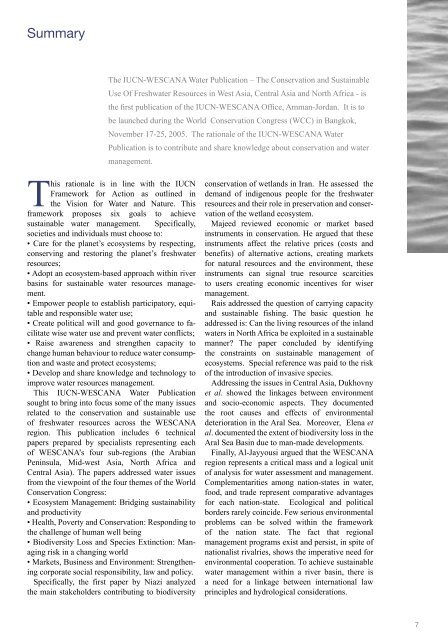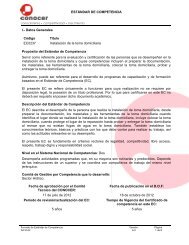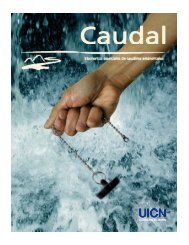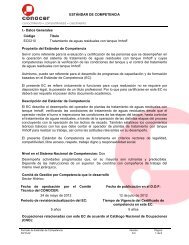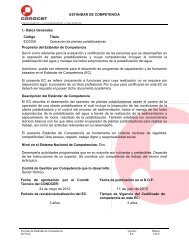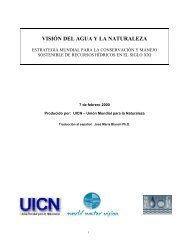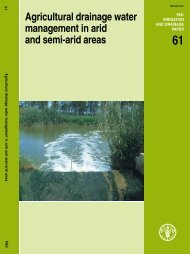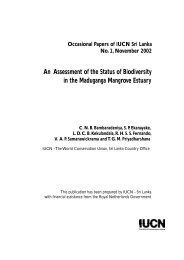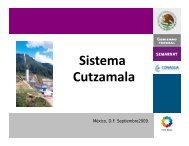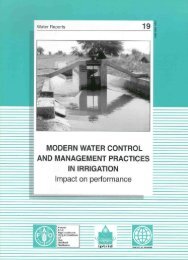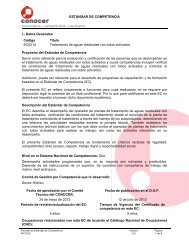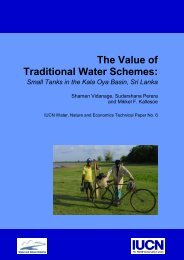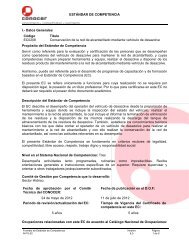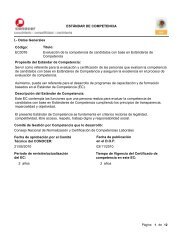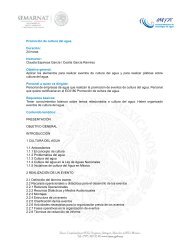The Conservation and Sustainable Use of Freshwater ... - IUCN
The Conservation and Sustainable Use of Freshwater ... - IUCN
The Conservation and Sustainable Use of Freshwater ... - IUCN
You also want an ePaper? Increase the reach of your titles
YUMPU automatically turns print PDFs into web optimized ePapers that Google loves.
Summary<br />
<strong>The</strong> <strong>IUCN</strong>-WESCANA Water Publication – <strong>The</strong> <strong>Conservation</strong> <strong>and</strong> <strong>Sustainable</strong><br />
<strong>Use</strong> Of <strong>Freshwater</strong> Resources in West Asia, Central Asia <strong>and</strong> North Africa - is<br />
the first publication <strong>of</strong> the <strong>IUCN</strong>-WESCANA Office, Amman-Jordan. It is to<br />
be launched during the World <strong>Conservation</strong> Congress (WCC) in Bangkok,<br />
November 17-25, 2005. <strong>The</strong> rationale <strong>of</strong> the <strong>IUCN</strong>-WESCANA Water<br />
Publication is to contribute <strong>and</strong> share knowledge about conservation <strong>and</strong> water<br />
management.<br />
This rationale is in line with the <strong>IUCN</strong><br />
Framework for Action as outlined in<br />
the Vision for Water <strong>and</strong> Nature. This<br />
framework proposes six goals to achieve<br />
sustainable water management. Specifically,<br />
societies <strong>and</strong> individuals must choose to:<br />
• Care for the planet’s ecosystems by respecting,<br />
conserving <strong>and</strong> restoring the planet’s freshwater<br />
resources;<br />
• Adopt an ecosystem-based approach within river<br />
basins for sustainable water resources management.<br />
• Empower people to establish participatory, equitable<br />
<strong>and</strong> responsible water use;<br />
• Create political will <strong>and</strong> good governance to facilitate<br />
wise water use <strong>and</strong> prevent water conflicts;<br />
• Raise awareness <strong>and</strong> strengthen capacity to<br />
change human behaviour to reduce water consumption<br />
<strong>and</strong> waste <strong>and</strong> protect ecosystems;<br />
• Develop <strong>and</strong> share knowledge <strong>and</strong> technology to<br />
improve water resources management.<br />
This <strong>IUCN</strong>-WESCANA Water Publication<br />
sought to bring into focus some <strong>of</strong> the many issues<br />
related to the conservation <strong>and</strong> sustainable use<br />
<strong>of</strong> freshwater resources across the WESCANA<br />
region. This publication includes 6 technical<br />
papers prepared by specialists representing each<br />
<strong>of</strong> WESCANA’s four sub-regions (the Arabian<br />
Peninsula, Mid-west Asia, North Africa <strong>and</strong><br />
Central Asia). <strong>The</strong> papers addressed water issues<br />
from the viewpoint <strong>of</strong> the four themes <strong>of</strong> the World<br />
<strong>Conservation</strong> Congress:<br />
• Ecosystem Management: Bridging sustainability<br />
<strong>and</strong> productivity<br />
• Health, Poverty <strong>and</strong> <strong>Conservation</strong>: Responding to<br />
the challenge <strong>of</strong> human well being<br />
• Biodiversity Loss <strong>and</strong> Species Extinction: Managing<br />
risk in a changing world<br />
• Markets, Business <strong>and</strong> Environment: Strengthening<br />
corporate social responsibility, law <strong>and</strong> policy.<br />
Specifically, the first paper by Niazi analyzed<br />
the main stakeholders contributing to biodiversity<br />
conservation <strong>of</strong> wetl<strong>and</strong>s in Iran. He assessed the<br />
dem<strong>and</strong> <strong>of</strong> indigenous people for the freshwater<br />
resources <strong>and</strong> their role in preservation <strong>and</strong> conservation<br />
<strong>of</strong> the wetl<strong>and</strong> ecosystem.<br />
Majeed reviewed economic or market based<br />
instruments in conservation. He argued that these<br />
instruments affect the relative prices (costs <strong>and</strong><br />
benefits) <strong>of</strong> alternative actions, creating markets<br />
for natural resources <strong>and</strong> the environment, these<br />
instruments can signal true resource scarcities<br />
to users creating economic incentives for wiser<br />
management.<br />
Rais addressed the question <strong>of</strong> carrying capacity<br />
<strong>and</strong> sustainable fishing. <strong>The</strong> basic question he<br />
addressed is: Can the living resources <strong>of</strong> the inl<strong>and</strong><br />
waters in North Africa be exploited in a sustainable<br />
manner? <strong>The</strong> paper concluded by identifying<br />
the constraints on sustainable management <strong>of</strong><br />
ecosystems. Special reference was paid to the risk<br />
<strong>of</strong> the introduction <strong>of</strong> invasive species.<br />
Addressing the issues in Central Asia, Dukhovny<br />
et al. showed the linkages between environment<br />
<strong>and</strong> socio-economic aspects. <strong>The</strong>y documented<br />
the root causes <strong>and</strong> effects <strong>of</strong> environmental<br />
deterioration in the Aral Sea. Moreover, Elena et<br />
al. documented the extent <strong>of</strong> biodiversity loss in the<br />
Aral Sea Basin due to man-made developments.<br />
Finally, Al-Jayyousi argued that the WESCANA<br />
region represents a critical mass <strong>and</strong> a logical unit<br />
<strong>of</strong> analysis for water assessment <strong>and</strong> management.<br />
Complementarities among nation-states in water,<br />
food, <strong>and</strong> trade represent comparative advantages<br />
for each nation-state. Ecological <strong>and</strong> political<br />
borders rarely coincide. Few serious environmental<br />
problems can be solved within the framework<br />
<strong>of</strong> the nation state. <strong>The</strong> fact that regional<br />
management programs exist <strong>and</strong> persist, in spite <strong>of</strong><br />
nationalist rivalries, shows the imperative need for<br />
environmental cooperation. To achieve sustainable<br />
water management within a river basin, there is<br />
a need for a linkage between international law<br />
principles <strong>and</strong> hydrological considerations.<br />
7


